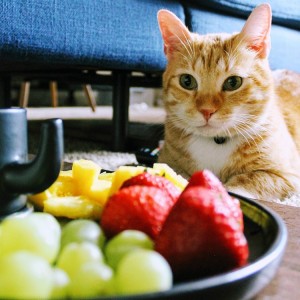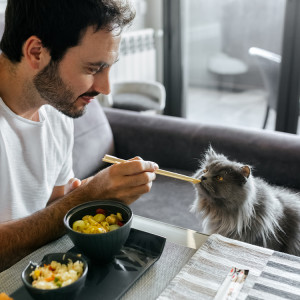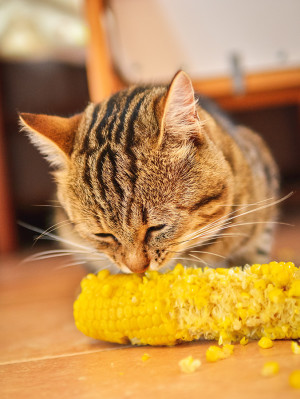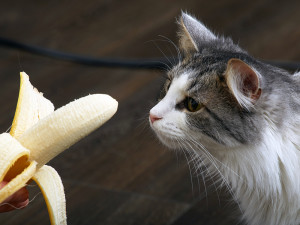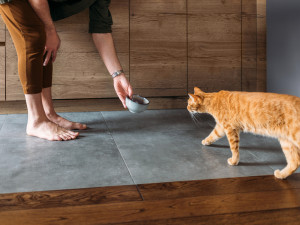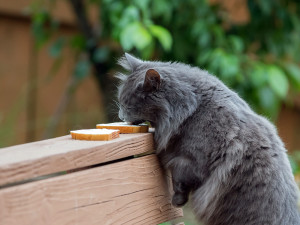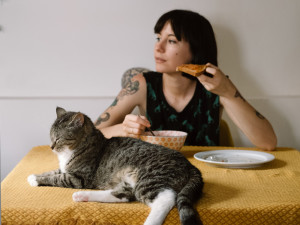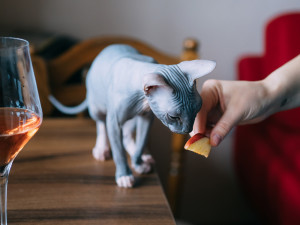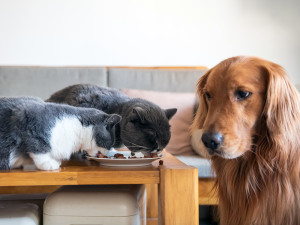Can Cats Eat Popcorn?
They want to enjoy movie night, too, you know.
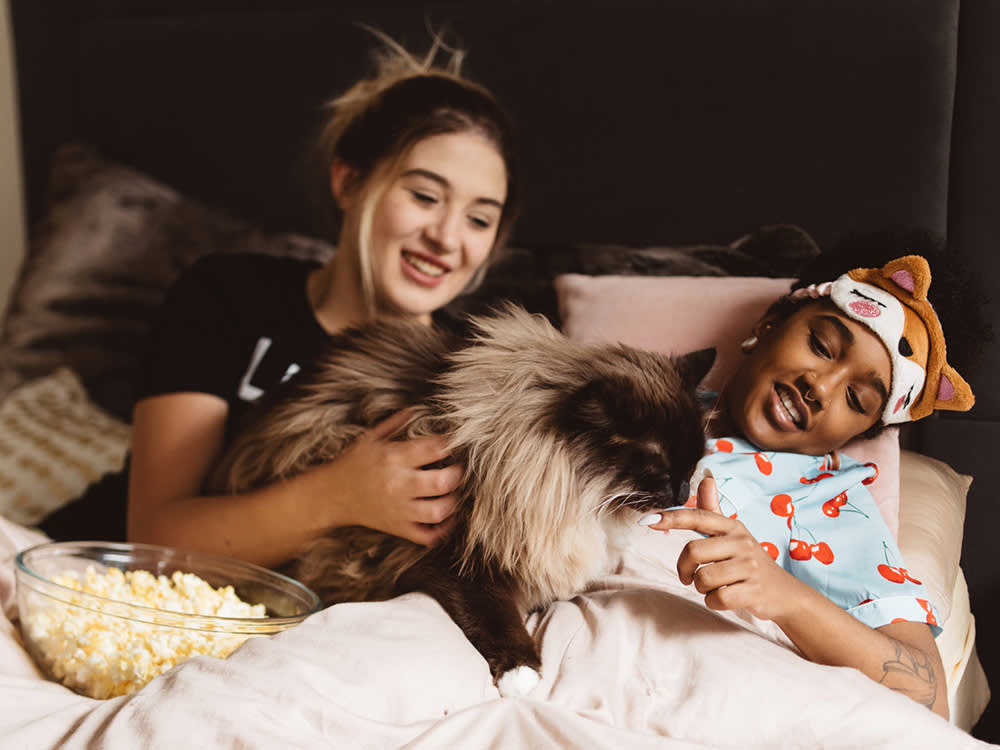
Share Article
Imagine you’re a cat. you are winding between your favorite person’s legs, adorably vying for head scratches, when a fluffy white puffball flies off the counter and lands at your feet. Do you, a) bat it around until it goes under the couch; b) carry it to your human’s bed and snuggle with it; or c) take a bite and let your teeth sink into the crunchy satisfaction of popped corn?
If you answered all of the above, you definitely think like a cat. And the good news is that popcorn is not only fun to play with, but is also safe for cats to snack on in moderation. Popcorn has some valuable health benefits, including fiber and antioxidants, that your kitty can enjoy as long as they eat it sparingly as an occasional snack. Learn more about the benefits of popcorn and how to safely share it with your cat.
Nutrition facts for popcorn for cats
Popcorn is a very popular snack food around the world, and its origins go back thousands of years. We’ve all likely enjoyed a warm, buttery tub of movie theater popcorn at some point in our lives but may never have given much thought to what it actually is.
Popcorn is the result of heating dried kernels of corn to a high enough temperature that the small amounts of water inside the kernel vaporize, increasing the pressure within the kernel until it literally explodes. The kernel bursts open and the starches inside the kernel expand as they are exposed to the steam from inside the kernel. And while that is probably more than you ever wanted to know about the intricacies of popped corn, this is useful in analyzing the nutritional benefits of popcorn for our kitty friends.
Popcorn is a corn product, and we know that corn is safe for cats and is often used as an ingredient in cat foods. It is primarily a carbohydrate used for its starch content, as well as a source of fiber. It also contains some important antioxidants. These can benefit your cat using the following nutrients:
Fiber: Fiber is a form of carbohydrate that can feed the good microbes within the digestive tract and bulk up the digested matter in the intestines. It can modify the transit time of this material and aid in digestion. It can help cats feel full on lower calorie diets and also prevent constipation.
Carbohydrates: Starch is a form of carbohydrate that provides energy, especially during and after intense activity. Cats do not have a specific need for carbohydrates but can and do use them for energy.
Polyphenols: These antioxidants are known to have many benefits in the body including protecting cells against damage from free radicals, improving insulin release, and reducing blood pressure.
Is popcorn good for cats?
Popcorn is non-toxic to cats and may provide some health benefits; however, it should only be used sparingly as the occasional treat. There are some important things to keep in mind if you are planning to share your popcorn with your cat.
Health benefits: Popcorn can provide some nutritional perks to your cat. The fiber, starches, and antioxidants in popcorn are all beneficial to your cat in moderation. If you are looking for ways to improve your cat’s overall fiber intake due to a health problem, however, be sure to speak with your vet and consider a special diet to provide a consistent fiber intake.
Mental enrichment: Popcorn is fun; it’s fluffy, it bounces, it crunches. Your cat may enjoy the opportunity to explore something new and broaden their horizons. Indoor catscan become sedentary and bored without enough enrichment. New foods, toys, and experiences help keep their days vibrant and exciting.
Beware of the carbs: While the starches in popcorn are a usable source of energy for cats, they should only make up a small portion of your cat’s diet. Because cats are obligate carnivores, they have a high demand for proteins and fats. Excessive carbohydrates can contribute to obesity and related conditions in cats including diabetes, arthritis, and heart disease. In general, a good rule of thumb is to limit all treats to less than 10 percent of your cat’s overall diet. Be sure the bulk of their diet is a complete and balanced cat food designed to meet their unique feline needs.
Hold the Toppings: If you do want to share the occasional popcorn snack with your cat, make sure to prepare it in a way that is safe for your kitty. This means using an air-popped method of cooking it and serving it plain to avoid oils, butter, salt, sugar, or any other toppings that may not be healthy for your cat.
Can cats eat uncooked popcorn kernels?
Uncooked popcorn kernels are very hard and not easily digestible. This can cause problems for your kitty if they ingest the kernels before they are cooked. They can damage teeth because of their very hard outer shell. They can also cause injuries to the digestive tract because they are sometimes pointy, and may scratch the delicate lining of the esophagus and/or intestines. Because they are very difficult to digest in this format, they may also cause digestive upset including gas, bloating, vomiting, or diarrhea. For all of these reasons, uncooked kernels should be kept out of reach of your cat.
Is popcorn completely safe for cats?
Generally speaking, the occasional bite of popcorn is safe for cats. There are some important points to keep in mind for safe snacking:
Choking hazards: Popcorn is large enough to be a choking risk if swallowed whole. Try to break off small pieces for your cat or crush them before sharing.
Avoid sodium: Many store-bought brands of popcorn have very high salt contents that could be unhealthy for your cat. Be sure to offer only plain, air-popped varieties to your cat. If you are making the popcorn yourself, set aside some plain kernels to share with your cat before adding salt, butter, or other seasonings to your portion.
Beware of other toxic ingredients: Always double-check the ingredients before sharing food with your cat. There are many common ingredients that can be toxic to cats, yet safe for us. This includes toppings like garlic salt, onion powder, or any sweeteners used in making kettle corn-style popcorn. Try to avoid microwave popcorn whenever possible; some varieties of microwave popcorn can irritate the lungs if they contain diacetyl butter flavoringopens in new tab.
The bottom line: Can cats eat human food?
There’s a common saying in veterinary medicine, which is that “cats are not just tiny dogs,” meaning that what works for dogs does not automatically work for cats. The same concept holds that cats are also not just tiny humans. While your cat may be your soulmate and have an uncanny knack for anticipating your every move, it doesn’t mean you and your cat can have the same diet.
Cats are different from both humans and dogs in that they are obligate carnivores. This means they have a higher demand for animal-derived proteins and fats and are not wired to process carbohydrates and sugars as well as omnivores. The best way to keep your cat healthy is to ensure the bulk of their diet is a complete and balancedopens in new tab cat food that is formulated carefully to meet their needs. Treats and the occasional scrap of human food should be no more than 10 percent of their total dietary intake.
There are many human foods that can be safe snacks and of course it is fun and enriching for your cat to be able to try something new from time to time. Be sure to double check that what you are offering is safe for your cat and always verify it with your vet if you are unsure about a particular food.
Other human foods that your cat can try:
Fruits, including apples, blueberries, and bananas are all safe for the occasional treat.
Peanut butter can be a high-protein snack option for cats.
Bread can be safe for cats, too — as long as it is fully-baked and offered sparingly.
Other human foods that are dangerous to cats:
Grapes and raisins are not safe to share with your cat
Onions and other veggies in the Allium family can cause a serious anemia in cats
Garlic is another plant in the Allium family that is also off-limits for cats
FAQs (People also ask):
How much popcorn can a cat eat?
Popcorn is nontoxic for cats and can be used as an occasional treat. As with all treats, it should be no more than ten percent of your cat’s total caloric intake since they need to get the bulk of their diet from a complete and balanced cat food.
Is it OK to give cats popcorn?
It is ok to give popcorn to cats as an occasional treat as long as your cat eats a balanced diet primarily. Be sure it is plain and does not contain any other ingredients that may be harmful. Also, try to offer it in small pieces to avoid choking.
Why do cats like popcorn?
Cats may be intrigued by the shape and texture of popcorn. It can be a fun item to swat around the house and this may make them curious to taste it too.
References:

Dr. Amy Fox, DVM
Amy Fox, DVM is a small animal veterinarian in New York City. A lifelong animal lover, Dr. Fox studied biology in college and then worked as a veterinary nurse before pursuing veterinary school at Cornell University. She has worked in many different settings including shelter medicine, emergency medicine, general practice, and animal cruelty and forensics. She is especially interested in nutrition, preventative medicine and care for senior pets. Dr. Fox also enjoys writing about veterinary medicine and teaching. In her free time she loves to cook, garden, and go for long runs.
Related articles
![Cat eating from a plate of raspberries and blueberries]()
Can Cats Eat Blueberries?
Go ahead and serve up the superfood — with a couple caveats.
![Profile view of a man giving a cat food to eat]()
Why Is My Cat Not Eating? Causes, Symptoms, and Treatment
A veterinary nutritionist explains why your cat isn’t eating and how to increase their appetite.
![Dark grey cat eating two slices of break laid on top of a wooden railing of an outdoor deck]()
Can Cats Eat Bread?
Go ahead and give your carb-loving cat a few bites, but don’t hand over the bread basket.
![A woman eating peanut butter toast with her cat laying on the table]()
Can Cats Eat Peanut Butter?
The sweet-and-salty treat is OK in moderation.
![A gray Sphynx cat sniffing an apple slice held out by her owner while standing on a table next to a glass of wine]()
Can Cats Eat Apples?
Yes, but the fruit might not hold much a-peel.
![Two grey cats eating dog food from a plate while a brown dog looks on with jealousy]()
Can Cats Eat Dog Food?
It shouldn’t be their main course. Here’s why.

